2016, the Year the Good-Ol’-Boy Brand of Sexual Harassment Took a Big Hit
Somewhere over the course of this utterly peculiar political year, there have been glimmers of a sea change in American sexual politics.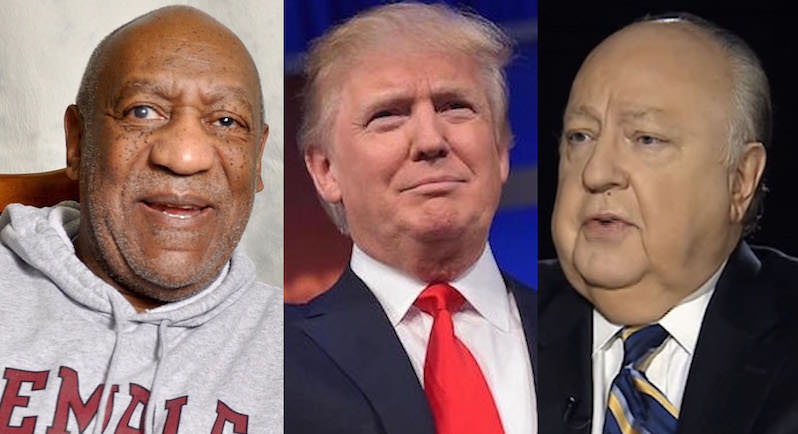
From left: comedian Bill Cosby, GOP presidential nominee Donald Trump and former Fox News chief Roger Ailes. (The World Affairs Council of Philadelphia / CC-BY; Gage Skidmore / CC BY-SA; YouTube)
Sexism can lurk in the unlikeliest of places. Or at least it can seem that way at first glance.
Remember American Apparel’s heyday about 10 years ago? Savvy hipsters were sold a bill of goods that ticked almost all the boxes required to represent the consumable, wearable version of their personal politics: eco-friendly, proudly “sweatshop-free,” locally produced.
Oh, and spectacularly misogynistic. Like other socially conscious causes—many of them hand-me-downs from the ’60s generation rebooted for the younger set—made into advertising schemes, some of American Apparel’s branding strategies were carefully tailored to meet stringent respectability standards. Others, such as the clothing manufacturer’s soft-core hard sell of women’s bodies, both in the corporate environment and in the company’s ads, were gleefully flaunted as naughty departures from an otherwise egalitarian ethos.
And shoppers looking to pair hemp-based fashions with an au courant sexual sensibility bought it, for a time. Meanwhile, those who initially called out the company risked being dismissed as throwbacks to a bygone era of shrill bra burners (even though bra-burning is a myth) and encouraged to get with the “sex-positive” program. Accusations that AA could be peddling a less-than-empowering product were met with a collective eye-roll. Until they weren’t.
This kind of retro-chic sexual exceptionalism has also enjoyed remarkable staying power among certain left-leaning male public figures who have taken care to monitor their political credentials and expunge any outward signs of harboring racist, homophobic, transphobic, classist and other damaging impulses—while repurposing cigars, prolifically sexting or exploring countless other ways to desanctify their marital bonds behind closed doors. Somehow, no matter how updated their politics might otherwise appear, sexism, however it’s dressed up, has been given the most enduring of passes.
READ: ‘Weiner’ Film Review: This Is What Our Democracy Looks Like
But that might not be permanent. Somewhere over the course of this utterly peculiar year, although certainly owing in part to the dedicated efforts of opposition researchers and political campaign strategists, there have been glimmers of a sea change in American sexual politics. This movement, such as it is, has occurred in no small part because of prominent cases like the reckonings of Bill Cosby and Roger Ailes. Both previously untouchable titans in their respective wings of the male-dominated media complex had failed to consider, for decades, that their alleged predation would ever truly cost them. And it didn’t—until it did.
So why now? First, because bank accounts and lucrative careers are somehow more at stake, and also because public attitudes about sexual harassment, rape culture, commodification, campus sexual assault and other related concerns have become slightly less accommodating. And while a couple of headline-grabbing instances may not add up to a fully realized, societywide phenomenon, it’s a start. Also, when it comes to some kinds of shifts in the zeitgeist, it’s particularly telling when even the richest and most powerful are unable to just lawyer up and pay their way out of a bind.
Another, more cynical test of an issue’s relevance has to do with its exploitability for political gain. Helpfully, we are in the throes of a singularly frenzied election season and are thus presented with a range of ready examples. Last week, Hillary Clinton’s media camp was shrewd enough, calculating enough, to accurately gauge the public mood about the issue of sexism and use it to their candidate’s advantage, turning Clinton’s most obvious point of difference into one voters could rally around (hint: “I’m With Her”). And to spend weeks “laying a trap” for Donald Trump, guessing correctly that, as he had with the Gold Star Khan family at the Democratic National Convention, her Republican counterpart would be so certain of his unassailable status that he would effectively make himself vulnerable.
Enter Alicia Machado, media-trained embodiment of what Clinton’s team is clearly hoping will become the final-stretch home run that will bring Trump’s play for the White House to an abrupt end. Machado virtually crashed last Monday’s first presidential debate between Clinton and Trump, as Clinton spun the story of how the former Miss Venezuela (and newly minted American citizen and voter) endured emotional abuse at the hands of Miss Universe honcho Donald Trump after she won the pageant in 1996.
Machado launched a media blitz the next day, and the mainstream press ran with it. Misogyny could be Trump’s “Achilles’ heel,” speculated a source quoted in The New Yorker. Trump is “doing lasting harm” to the GOP, said a three-man chorus of Washington Post reporters. Trump also played right into Clinton’s plan by falling back on predictable strategies. Namely, he insisted that he was set up and attempted to slut-shame Machado in a series of tweets composed and loosed in the wee hours.
So it goes in campaign warfare, and to the chagrin of Trump’s handlers, it’s still going. But doesn’t all this amount to only so much political posturing and recycled talk about glass ceilings and gender biases for personal benefit at the polls? No doubt. Yet perhaps there’s an upside to be found somewhere in this headline jockeying, in that a politically powerful American man’s track record with regard to his treatment of women—recalling an extensive greatest-hits compilation that includes not only Clintonesque womanizing but Gary Hart’s Monkey Business, Gary Condit’s tragic liaison with an intern, John Edwards’ 2007 flameout, Newt Gingrich’s and Rudy Giuliani’s extramarital indiscretions, and JFK’s romanticized dalliances—has now become the basis for a bigger conversation about his readiness for public office.
Trump’s well-documented negative treatment of women before and during this election cycle, as of Monday the subject of an Associated Press investigation, hails from an old-school chauvinism that, unfortunately, isn’t under the exclusive auspices of his generation or party. But missing from some more general analysis of Trump’s fast-and-loose relationship with the truth is an explicit link between his apparent sense of entitlement to say what he pleases, when he pleases, campaign advisers be damned, and what is commonly (and in this case accurately) referred to as “male privilege.”
Trump’s breezy proficiency with making witheringly sexist statements suggests his confidence that he doesn’t need to check himself on the subject of women primarily because he will remain untouched by the consequences. And he still may. But it can also be argued that he has already suffered measurable setbacks in his quest for the White House as a direct result of his gender politics, which is significant in itself.
Some of his supporters and ideological allies will cry political correctness and claim they are stifled by this barrage of talk about mansplaining and manterruption, and what’s this country coming to if a man can’t enjoy a little slap-and-tickle in the comfort of his own workplace? But if the legitimate grievances expressed in response to even staged events can still slip through the barricades that anti-P.C. prohibitions so successfully establish, they could become part of a national discussion in a way that exerts pressure on the most influential and works its way down.
So while of course it’s going to be fodder for the mainstream media, in a contentious election season, that the Republican nominee once allegedly called a female reporter a “cunt,” the fact that it is considered newsworthy and is being leveraged against him could also indicate a broader public mood. Ideally, it would also hint at a shift around the country toward making everyday misogyny a relic of the past.
And that, even more than the flashpoint moments from the campaign trail or the big payouts for high-profile victims, would be the tipoff that, this time, change just might take.
Independent journalism is under threat and overshadowed by heavily funded mainstream media.
You can help level the playing field. Become a member.
Your tax-deductible contribution keeps us digging beneath the headlines to give you thought-provoking, investigative reporting and analysis that unearths what's really happening- without compromise.
Give today to support our courageous, independent journalists.

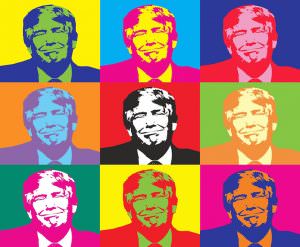
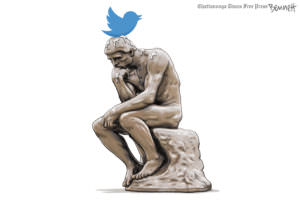
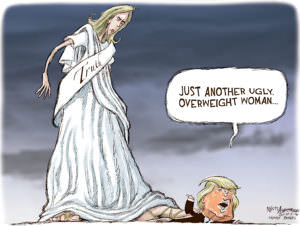
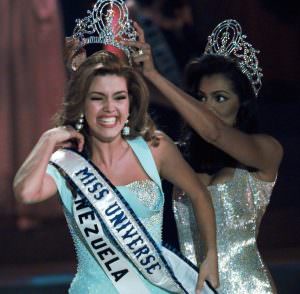
You need to be a supporter to comment.
There are currently no responses to this article.
Be the first to respond.